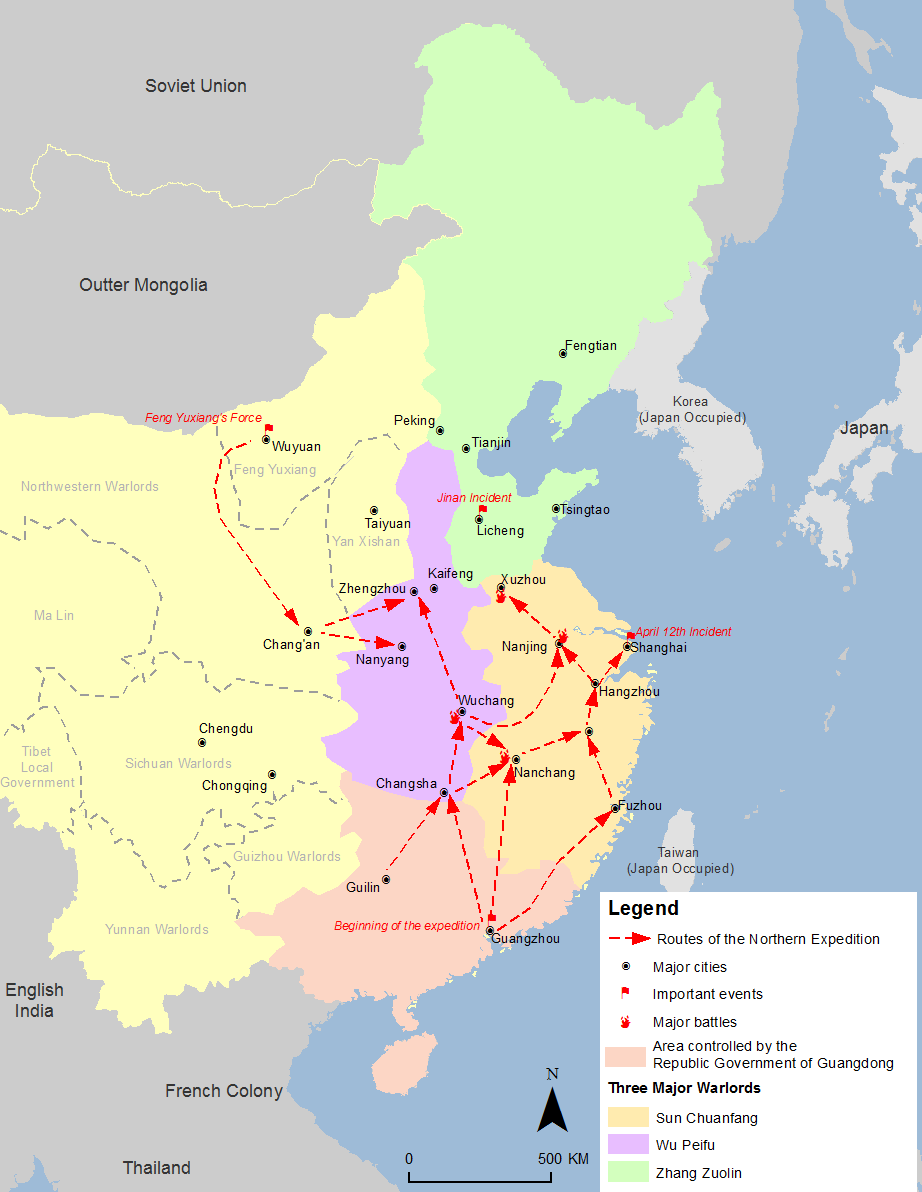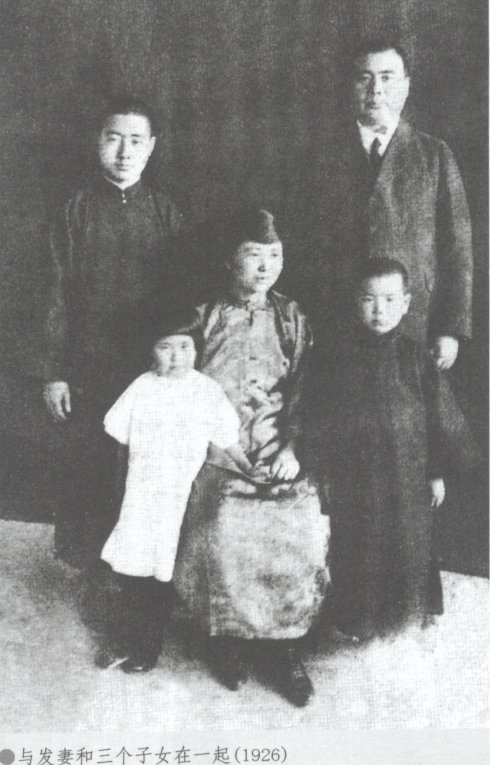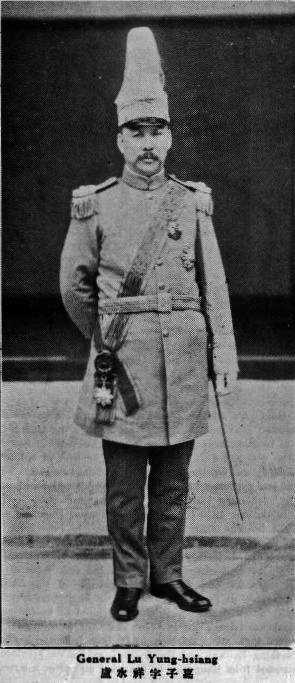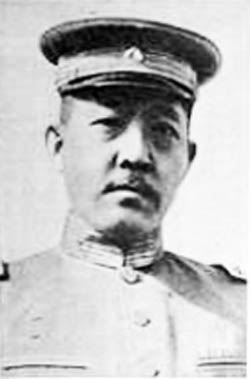|
Sun Chuanfang
Sun Chuanfang () (April 17, 1885 – November 13, 1935) a.k.a. the "Nanking Warlord" or leader of the "League of Five Provinces" was a Zhili clique warlord and protégé of the "Jade Marshal" Wu Peifu (1874–1939). Biography Sun Chuanfang was born in Licheng, Shandong Province. Wang Yingkai, a rising officer in the Beiyang Army and protégé of Yuan Shikai, the commander of the Beiyang Army, married Sun's sister, and Sun took advantage of his brother-in-law's position and joined a training camp in 1902. Wang later recommended Sun to Tianjin Military Academy because of the latter's outstanding capabilities; in 1904 he also sent Sun abroad to Japan for more education at the Tokyo Shimbu Gakko, a military preparatory school. Sun eventually graduated from the sixth class of the Imperial Japanese Army Academy and returned to China in 1908. Upon his return from Japan, Wang and his political ally, Tie Liang, happened to be the ones presiding over the examination aimed at testing f ... [...More Info...] [...Related Items...] OR: [Wikipedia] [Google] [Baidu] |
Licheng District, Jinan
Licheng District () is one of 10 urban districts of the prefecture-level city of Jinan, the capital of Shandong Province, East China, covering part of the eastern suburbs. It has an area of 1,303.88 km2 and has 1,124,306 permanent residents . The Jinan Yaoqiang International Airport is located in the district's northern reaches. The largest county-level division of Jinan by permanent resident population, it borders Zhangqiu District to the east, Changqing District to the southwest, the districts of Shizhong, Lixia, and Tianqiao to the west, Jiyang District to the northwest, as well as the prefecture-level city of Tai'an to the southeast. Administrative divisions As 2012, this district is divided to 6 subdistricts and 11 towns. ;Subdistricts ;Towns See also * Nine Pinnacle Pagoda The Nine Pinnacle Pagoda or Jiuding Pagoda (, sometimes translated as "Nine Roof Pagoda") is an 8th-century pavilion-style brick pagoda located in central Shandong Province, China. It is no ... [...More Info...] [...Related Items...] OR: [Wikipedia] [Google] [Baidu] |
Fujian
Fujian (; alternately romanized as Fukien or Hokkien) is a province on the southeastern coast of China. Fujian is bordered by Zhejiang to the north, Jiangxi to the west, Guangdong to the south, and the Taiwan Strait to the east. Its capital is Fuzhou, while its largest city by population is Quanzhou, both located near the coast of the Taiwan Strait in the east of the province. While its population is predominantly of Chinese ethnicity, it is one of the most culturally and linguistically diverse provinces in China. The dialects of the language group Min Chinese were most commonly spoken within the province, including the Fuzhou dialect of northeastern Fujian and various Hokkien dialects of southeastern Fujian. Hakka Chinese is also spoken, by the Hakka people in Fujian. Min dialects, Hakka and Mandarin Chinese are mutually unintelligible. Due to emigration, a sizable amount of the ethnic Chinese populations of Taiwan, Singapore, Malaysia, Indonesia, and the Philippines ... [...More Info...] [...Related Items...] OR: [Wikipedia] [Google] [Baidu] |
Zhang Zongchang
Zhang Zongchang (1881 – 3 September 1932) was a Chinese warlord in Shandong in the early 20th century. ''Time'' dubbed him China's "basest warlord". He was known by many nicknames such as the "Dogmeat General" (), based on the name of his favorite card game or tonic. Biography Early life and career Zhang was born in 1881 in Yi County (now Laizhou) in Shandong. His family was poor. Zhang's father worked as head shaver and trumpeter, and was an alcoholic. His mother was an exorcist and "practicing witch". His parents eventually separated. Zhang stayed with his mother who had taken a new lover. In his teens, Zhang's family moved to Manchuria, where Zhang became involved in petty crime in Harbin. He successively worked as a pickpocket, bouncer, and prospector. At some point, he worked in Siberia, learning Russian. Zhang eventually became a bandit in the Chinese countryside, though served as auxiliary for the Imperial Russian Army during the Russo-Japanese War in 1904–1905. ... [...More Info...] [...Related Items...] OR: [Wikipedia] [Google] [Baidu] |
Guominjun
The Guominjun (), a.k.a. Nationalist Army, KMC, also called the Northwest Army (西北軍) or People's Army, refers to the military faction founded by Feng Yuxiang, Hu Jingyi and Sun Yue during China's Warlord Era. History The Guominjun was formed when Feng betrayed the Zhili clique during the Second Zhili–Fengtian War with the Fengtian clique in 1924. The Guominjun occupied Beijing, captured Zhili leader Cao Kun and expelled former Qing dynasty emperor Puyi from the Forbidden City. In late 1925, Fengtian general Guo Songling defected to the KMC; this sparked the Anti-Fengtian War against Zhang Zuolin. The Guominjun was incorporated into the Kuomintang's National Revolutionary Army as the "Second Collective Army" in 1928 during the Northern Expedition, and fought alongside the KMT to defeat Fengtian forces (National Pacification Army) and capture Beijing. In 1929, Feng grew increasingly dissatisfied with Chiang Kai-shek's regime; the Guominjun launched a full rebe ... [...More Info...] [...Related Items...] OR: [Wikipedia] [Google] [Baidu] |
Feng Yuxiang
Feng Yuxiang (; ; 6 November 1882 – 1 September 1948), courtesy name Huanzhang (焕章), was a warlord and a leader of the Republic of China from Chaohu, Anhui. He served as Vice Premier of the Republic of China from 1928 to 1930. He was also known as the "Christian General" for his zeal to convert his troops and the "Traitorous General" for his penchant to break with the establishment. In 1911 he was an officer in the ranks of Yuan Shikai's Beiyang Army but joined forces with revolutionaries against the Qing dynasty. He rose to high rank within Wu Peifu's Zhili warlord faction but launched the Beijing Coup in 1924 that knocked Zhili out of power and brought Sun Yat-sen to Beijing. He joined the Nationalist Party (KMT), supported the Northern Expedition and became blood brothers with Chiang Kai-shek, but resisted Chiang's consolidation of power in the Central Plains War and broke with him again in resisting Japanese incursions in 1933. He spent his later years supporti ... [...More Info...] [...Related Items...] OR: [Wikipedia] [Google] [Baidu] |
Zhang Zuolin
Zhang Zuolin (; March 19, 1875 June 4, 1928), courtesy name Yuting (雨亭), nicknamed Zhang Laogang (張老疙瘩), was an influential Chinese bandit, soldier, and warlord during the Warlord Era in China. The warlord of Manchuria from 1916 to 1928, and the military dictator of the Republic of China in 1927 and 1928, he rose from banditry to power and influence. Backed by Japan, Zhang successfully influenced politics in the Republic of China during the early 1920s. In the fall of 1924, during the Second Zhili–Fengtian War, he invaded and gained control of Peking, including the internationally recognized government, in April 1926. His appointment as grand marshal of the Republic of China in June 1927 represented the height of his success, but was quickly followed by defeat: the economy of Manchuria, the basis of his power, was overtaxed by his adventurism and collapsed in the winter of 1927; and he was defeated by the National Revolutionary Army of the Kuomintang under Gener ... [...More Info...] [...Related Items...] OR: [Wikipedia] [Google] [Baidu] |
Second Zhili–Fengtian War
The Second Zhili–Fengtian War (Second Chihli-Fengtien War; ) of 1924 was a conflict between the Japanese-backed Fengtian clique based in Manchuria, and the more liberal Zhili clique controlling Beijing and backed by Anglo-American business interests. The war is considered the most significant in China's Warlord era, with the Beijing coup by Christian warlord Feng Yuxiang leading to the overall defeat of the Zhili clique. During the war the two cliques fought one large battle near Tianjin in October 1924, as well as a number of smaller skirmishes and sieges. Afterwards, both Feng and Zhang Zuolin, the latter being ruler of the Fengtian clique, appointed Duan Qirui as a figurehead prime minister. In south and central China, more liberal Chinese were dismayed by the Fengtian's advance and by the resulting power vacuum. A wave of protests followed. The war also distracted the northern warlords from the Soviet-backed Nationalists based in the southern province of Guangdong, allowing ... [...More Info...] [...Related Items...] OR: [Wikipedia] [Google] [Baidu] |
Zhejiang
Zhejiang ( or , ; , also romanized as Chekiang) is an eastern, coastal province of the People's Republic of China. Its capital and largest city is Hangzhou, and other notable cities include Ningbo and Wenzhou. Zhejiang is bordered by Jiangsu and Shanghai to the north, Anhui to the northwest, Jiangxi to the west and Fujian to the south. To the east is the East China Sea, beyond which lies the Ryukyu Islands. The population of Zhejiang stands at 64.6 million, the 8th highest among China. It has been called 'the backbone of China' due to being a major driving force in the Chinese economy and being the birthplace of several notable persons, including the Chinese Nationalist leader Chiang Kai-shek and entrepreneur Jack Ma. Zhejiang consists of 90 counties (incl. county-level cities and districts). The area of Zhejiang was controlled by the Kingdom of Yue during the Spring and Autumn period. The Qin Empire later annexed it in 222 BC. Under the late Ming dynasty and the Qing ... [...More Info...] [...Related Items...] OR: [Wikipedia] [Google] [Baidu] |
Wusong
Wusong, formerly romanized as Woosung, is a subdistrict of Baoshan in northern Shanghai. Prior to the city's expansion, it was a separate port town located down the Huangpu River from Shanghai's urban core. Name Wusong is named for the Wusong River, a former name for Shanghai's Suzhou Creek. Suzhou Creek is now a tributary to the Huangpu River, emptying into it in Puxi across from Lujiazui and just north of the Bund. The Huangpu had previously been a tributary to the Wusong, but the two reversed their importance when a flood caused it to gain a number of the Wusong's former tributaries. The location where the Huangpu and Wusong meet was generally known as ''Wusongkou'' ("mouth of the Wusong"). History Wusong housed a Qing fortress protecting the entrance to Shanghai. It was captured by the British during the Battle of Woosung on 16 June 1842, amid the First Opium War. During the steamship era, it was the point of departure for large steamers bound for Shanghai. This posit ... [...More Info...] [...Related Items...] OR: [Wikipedia] [Google] [Baidu] |
Shanghai
Shanghai (; , , Standard Mandarin pronunciation: ) is one of the four direct-administered municipalities of the People's Republic of China (PRC). The city is located on the southern estuary of the Yangtze River, with the Huangpu River flowing through it. With a population of 24.89 million as of 2021, Shanghai is the most populous urban area in China with 39,300,000 inhabitants living in the Shanghai metropolitan area, the second most populous city proper in the world (after Chongqing) and the only city in East Asia with a GDP greater than its corresponding capital. Shanghai ranks second among the administrative divisions of Mainland China in human development index (after Beijing). As of 2018, the Greater Shanghai metropolitan area was estimated to produce a gross metropolitan product (nominal) of nearly 9.1 trillion RMB ($1.33 trillion), exceeding that of Mexico with GDP of $1.22 trillion, the 15th largest in the world. Shanghai is one of the world's major centers for ... [...More Info...] [...Related Items...] OR: [Wikipedia] [Google] [Baidu] |
Lu Yongxiang (warlord)
Lu Yongxiang, (; October 22, 1867 – May 15, 1933), Anhui clique warlord, military governor of Zhejiang, Zhili, and Jiangsu. Lu Yongxiang was born October 22, 1867, in Jiyang, Shandong, China. Impoverished as a child, he joined the Huai Army in 1890. In 1895 he joined the new Beiyang Army, rising to brigade commander. At the time of the 1911 Xinhai Revolution Lu was given command of the Beiyang 3rd Division. After the Republic of China was established, Lu was appointed commander of the Beiyang Tenth Division, guarding Zhejiang. For joining Duan Qirui, as part of the Anhui clique Lu was made military governor of Zhejiang from August 14, 1919 to September 7, 1924. Near the end of his term as Zhejiang governor he fell out with his counterpart, Jiangsu governor Qi Xieyuan, over control of Shanghai and their conflict became the First Jiangsu-Zhejiang War. Lu was defeated by Qi and his Zhili clique allies, most importantly Sun Chuanfang, when Sun attacked from the south. His cont ... [...More Info...] [...Related Items...] OR: [Wikipedia] [Google] [Baidu] |
Qi Xieyuan
Qi Xieyuan (; April 28, 1885 - December 18, 1946), born Qi Ying, with a courtesy name of Qi Fuwan and the art name of Yaoshan, was a general of the military of the Republic of China and a warlord of the Zhili clique. He defected to the Japanese after the creation of the Provisional Government of the Republic of China, later participating in the North China Political Council, its successor. Zhili commander Early career Born in what is now part of Tianjin, Qi Xieyuan studied at the Tianjin Military Academy (also known as the Beiyang Military Academy), attending the Army University and subsequently the Imperial Japanese Army Academy after graduating. He was a ''shengyuan'' of the Qing Imperial examination system. He entered the 6th Division of the Beiyang Army, beginning his military career. In 1913, he served as the brigade commander of the 12th Brigade of the 6th Division, the commander of the 6th Division itself, as well as the Chief of Staff of Jiangxi province. In 1917, Qi Xi ... [...More Info...] [...Related Items...] OR: [Wikipedia] [Google] [Baidu] |





%2C_King_of_Wuyue.jpg)

